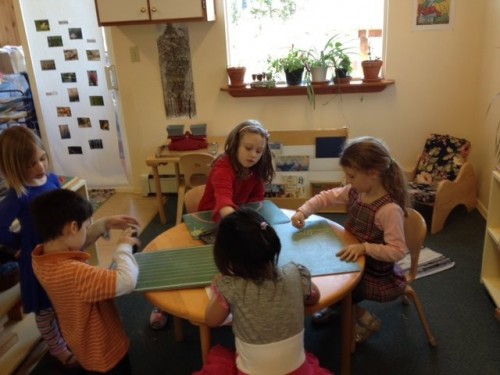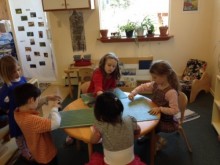— from Jim Connell and Joe Cohen —
 Orcas Island’s four pre-schools, Montessori, Children’s House, Kaleidoscope and Salmonberry have combined school fundraising, parent tuition and community-based “investment” dollars to provide all Orcas 3-5 year-olds access to quality early childhood education.
Orcas Island’s four pre-schools, Montessori, Children’s House, Kaleidoscope and Salmonberry have combined school fundraising, parent tuition and community-based “investment” dollars to provide all Orcas 3-5 year-olds access to quality early childhood education.
Research shows that children who attend pre-school at least 12 hours per week, and are taught by qualified staff, enter kindergarten more ready to succeed. In addition to achieving the targeted attendance threshold, this project also provides financial and educational incentives for all staff working with children to achieve their Washington State Childhood Development Accreditation by the end of 2014-15 school year.
Joe Cohen and the late Bob Henigson originally had an idea for providing stable funding and development support for a pre-school opportunity on Orcas. The idea began with providing universal access but quickly added teaching quality support as well. Cohen and Henigson hoped that sustainable and adequate funding for pre-school education would eventually become a reality on Orcas.
In 2013 a working group of representatives from the four Orcas schools, Amber Paulsen (Kaleidoscope), Susan Anderson (Children’s House), Eliza Morris (Salmonberry) and Teresa Chocano (Montessori), along with Sage MacLeod (WA State ECAP representative), Dale Heisinger, Martha Farish and Joe Cohen met twice monthly, over a six-month period, to organize this effort. Jim Connell, Orcas resident and national education consultant, facilitated the meetings. Six private “investors” from the community came forward to fund the gap between tuition and school fundraisers and the actual cost of achieving program goals.
While research is clear that early access to quality education is a win for all, what has been missing is the political will to adequately fund early childhood education from the State level. “We thought, on an island, with a fairly manageable number of preschool students in residence, we ought to be able to give all our kids the great start that everyone else thought had to “wait” for the political will to emerge,” says Joe Cohen. “We felt the time was now; not later”.
The project’s first year goals are:
· To achieve a minimum threshold of 12 hours per week for all children enrolled in each of the school’s programs.
· To have all staff working with children achieve their Childhood Development Accreditation through a State accredited institution by December 2015.
· To establish an effective protocol for the allocation of financial resources to each school to achieve higher quality school age readiness for all.
In subsequent years:
· To bring all children, even those entering pre-school less prepared than their peers, up to school readiness by the time they reach kindergarten.
· To further strengthen the quality of the instructional experience for children.
· To use common measurements to assess student learning and teacher’s practices during the 3-year span of this demonstration project.
**If you are reading theOrcasonian for free, thank your fellow islanders. If you would like to support theOrcasonian CLICK HERE to set your modestly-priced, voluntary subscription. Otherwise, no worries; we’re happy to share with you.**









This is rich and wonderful for our island kids! Thanks so much to all involved!
As usual, I’m in full agreement with Coleen O’Brien. Wonderful collaboration among the parties involved, great opportunity to make a major difference in the lives of Orcas kids. Let’s pull together to make it happen.